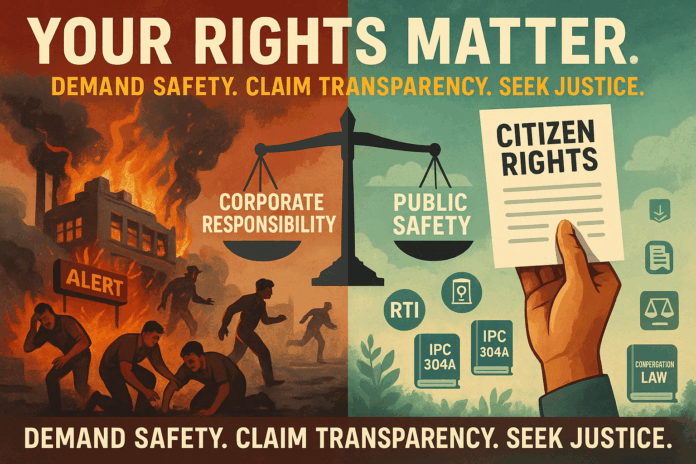In Wake of Sigachi Blast: Citizen Rights, Safety & Corporate Duty
The devastating reactor explosion at Sigachi Industries raises crucial questions about the interplay between corporate responsibility, regulatory oversight, and citizens’ rights.
1. Right to Safe Working Conditions
Under the Industrial Disputes Act and relevant state labour laws, every worker is entitled to a safe workplace. Incidents like these are clear violations and should trigger inquiries under the Factories Act for non-compliance with safety norms.
2. Right to Information & Transparency
Citizens and families have a right to truth under the Right to Information (RTI) Act. They can demand details on:
-
Cause of the accident
-
Corporate safety audits
-
Rescue records
-
Compensation data
3. Right to Timely Compensation
State guidelines mandate immediate relief. The ₹200,000 announced by PM Modi and ₹50,000 per injured person are start, but affected families can claim additional compensation under relevant labour and disaster relief laws (e.g. Workmen’s Compensation Act, State Disaster Response Fund policies).
4. Right to Legal Recourse
Families may pursue civil liability actions or criminal negligence charges against the company under Sections 304A/337/338 of the Indian Penal Code. Aggregate lawsuits, or Public Interest Litigations (PILs), can broaden legal scrutiny and ensure systemic change.
5. Right to Participate in Policy Reform
Public pressure can drive better regulations. Citizens can petition for:
-
Regular, unannounced safety audits
-
Independent monitoring
-
Mandatory whistleblower protection
-
Stricter penalties for repeated safety violations
This calamity highlights systemic weaknesses in enforcing industrial safety. Citizens must leverage legal rights, demand transparency, and advocate for continual improvements not just one-off responses.










